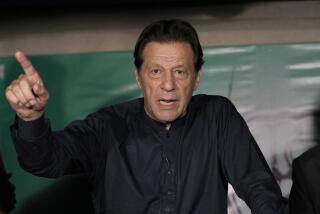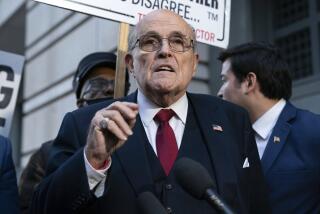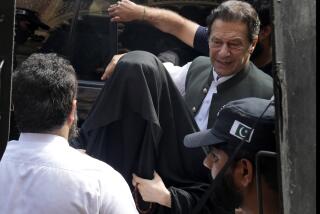Pakistan Supreme Court indicts prime minister
- Share via
Reporting from Islamabad, Pakistan —
Pakistan’sSupreme Court on Monday indicted Prime Minister Yousuf Raza Gilani on contempt charges, accusing him of repeatedly ignoring its orders to revive long-standing corruption proceedings against the nation’s president.
Gilani must now brace for a trial in coming weeks that could end in his conviction, his disqualification from holding office for five years and a prison term of up to six months.
Appearing in the packed courtroom, Gilani could have forestalled the indictment by telling the seven-judge panel that he would comply with its order to write a letter to Swiss authorities asking that they reopen a money laundering case against President Asif Ali Zardari. Instead, Gilani pleaded not guilty after Justice Nasirul Mulk detailed the charges. He is Pakistan’s first prime minister to be indicted while in office.
A Swiss court in 2003 convicted Zardari and his late wife, former Prime Minister Benazir Bhutto, in absentia of laundering millions of dollars in bribes from Swiss firms while Bhutto was in power. Bhutto was assassinated in 2007, and Zardari assumed leadership of her party and the presidency a year later.
Swiss authorities dropped the case at the request of the Pakistani government in 2008, a year after military ruler Pervez Musharraf granted an amnesty for politicians and bureaucrats accused in corruption cases. The Supreme Court in 2009 ruled that the amnesty was unconstitutional and ordered the reopening of the cases that had been set aside, including the Swiss case.
Gilani has consistently stood by Zardari’s claim that the president cannot be prosecuted while in office. He said he is willing to go to jail on a contempt conviction rather than pursue a reopening of the Swiss case.
“For the first time, the prime minister has been charged. It’s a sad day in the history of Pakistan,” Qamar Zaman Kaira, a leading lawmaker in Zardari’s party, told reporters outside the courthouse.
Gilani’s indictment is the culmination of a protracted battle between Pakistan’s beleaguered civilian government and an aggressive Supreme Court that some observers view as intent on bringing down Zardari and his team.
Along with the Swiss case, the high court has been investigating a Pakistani American businessman’s allegations that Zardari’s onetime ambassador to the U.S. engineered a memo requesting Washington’s assistance in preventing a potential military overthrow of Pakistan’s government last year. The case could ramp up pressure on the president if it’s shown that he orchestrated the memo or authorized it.
Supporters of the Supreme Court say it is simply carrying out its legal responsibilities by scrutinizing Zardari and his government. Other experts, however, say bad blood between Zardari and the chief justice, Iftikhar Mohammed Chaudhry, may explain the court’s actions against the president.
After Musharraf was driven out of office in 2008, Zardari became president and later reinstated many of the judges fired by the former ruler. But he balked at reinstating others, including Chaudhry — a hesitation many in Pakistan believe was tied to Zardari’s fear that the senior judge would revive old graft cases involving the president. Zardari eventually reinstated Chaudhry after intense political pressure.
Although Gilani’s conviction would be a serious setback for Zardari’s government, experts say the ruling Pakistan People’s Party, or PPP, still has the votes in parliament to be able to select the prime minister’s replacement and stay in power until national elections, which are slated for 2013 but could be held this year.
Gilani appears to have agreed to sacrifice himself for the sake of his party, analysts say. Zardari has the authority to keep the prime minister out of jail with a presidential pardon, but Gilani still would be ousted as prime minister and would not be able to serve in parliament if convicted.
Though Swiss authorities have said they believe the president is protected by constitutional immunity, analysts say Zardari’s team is reluctant to write the Swiss government about the case because doing so could signal to the Swiss that the Pakistani government no longer thinks Zardari is legally shielded.
Gilani’s lawyer, Aitzaz Ahsan, has argued that Gilani should not be punished for not complying with the court’s order because he was following the advice of his legal team to not write the letter.
“The prime minister has not done anything unconstitutional,” Mehreen Anwar Raja, a PPP lawmaker and former law minister, said outside the courthouse. “The case is there, and God willing, we will defend it because we have not done anything wrong.”
More to Read
Sign up for Essential California
The most important California stories and recommendations in your inbox every morning.
You may occasionally receive promotional content from the Los Angeles Times.










